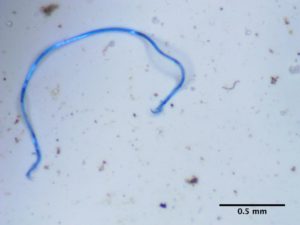 Tiny particles of plastic, called microplastics, have now been detected in human blood. Yikes! We all know that plastic pollution is a serious problem in the environment, but recent research has been finding it in our food, in the air, in water, in rain, our organs (including our lungs and brain), human placentas, and now in our blood.
Tiny particles of plastic, called microplastics, have now been detected in human blood. Yikes! We all know that plastic pollution is a serious problem in the environment, but recent research has been finding it in our food, in the air, in water, in rain, our organs (including our lungs and brain), human placentas, and now in our blood.
The most widely found microplastic particles in the blood were polyethylene terephthalate (PET) (commonly used in disposable water bottles), and polystyrene (PS), which is used for food packaging and polystyrene foam.
The big question is: What are microplastics doing to us, if anything?
The first studies are finding that microplastics are causing inflammation and damage to cells (not good), and are building up in us, but we don't really know much at all. Will it increase the risk of cancer? Scientists are also concerned over the chemicals in the microplastics. For example, if there are endocrine disrupting chemicals in the microplastics, then what effect (if any) are they having on us?
But... plastic production is increasing every year, so we can expect to be exposed to more plastic over time, which means more will get into us and the environment. And the particles will build up.
You may wonder why there are so many little plastic particles out there - it's because plastic breaks apart over time. Even when we do laundry - there are little plastic particles released into the drain water from synthetic fabrics. When we drink from plastic water bottles, little plastic particles released from the bottles are ingested by us. And yes, water bottles are a big source of microplastics ingested by us - up to an additional 90,000 microplastics per year!
Bottom line: try to cut back on your use of plastic, which means buying less of plastic goods - for example, in beverage containers (opt for glass bottles instead), in furniture and toys, in our homes (wood or tile instead of vinyl as much as possible). Avoid drinking from plastic water bottles.
From Smithsonian: Microplastics Detected in Human Blood in New Study
Microplastics, or tiny plastic particles, are ubiquitous pollutants found almost everywhere on earth. Scientists have detected microplastics near the peak of Mount Everest, in the Mariana Trench and even in baby poop. But researchers have now found a new vessel for microplastics: human blood. ...continue reading "Microplastics Are Found In Human Blood"

 Interesting and amusing science books can be hard to find, but I found a good one. Science writer Mary Roach's book Fuzz: When Nature Breaks the Law examines all sorts of human-wildlife conflicts, from murder and manslaughter, to home invasion, to wildlife vandals. Lots of quirky and weird stories.
Interesting and amusing science books can be hard to find, but I found a good one. Science writer Mary Roach's book Fuzz: When Nature Breaks the Law examines all sorts of human-wildlife conflicts, from murder and manslaughter, to home invasion, to wildlife vandals. Lots of quirky and weird stories. After reading the
After reading the  HAPPY HOLIDAYS!
HAPPY HOLIDAYS!



 Congratulations America! The contiguous (lower 48 states) United States just had its hottest summer ever! This is not something to brag about, but a taste of coming attractions due to climate change. This year we've had heat wave after heat wave, drought in the west, humid tropical-type heat in the east, hurricanes, tornadoes, tropical storms, and so on. Whew...
Congratulations America! The contiguous (lower 48 states) United States just had its hottest summer ever! This is not something to brag about, but a taste of coming attractions due to climate change. This year we've had heat wave after heat wave, drought in the west, humid tropical-type heat in the east, hurricanes, tornadoes, tropical storms, and so on. Whew... It's finally over. One hundred years after leaded gasoline was first introduced, it is finally no longer used in automobiles and road vehicles anywhere in the world. Algeria was the last country to use leaded gas (it had stockpiles of it and wanted to use it up), and in July 2021 they made the switch to unleaded gas. Finally.
It's finally over. One hundred years after leaded gasoline was first introduced, it is finally no longer used in automobiles and road vehicles anywhere in the world. Algeria was the last country to use leaded gas (it had stockpiles of it and wanted to use it up), and in July 2021 they made the switch to unleaded gas. Finally. It's the last full week of August, with sweltering heat and humidity. These are basically the only flowers left that the deer haven't eaten and destroyed.
It's the last full week of August, with sweltering heat and humidity. These are basically the only flowers left that the deer haven't eaten and destroyed.